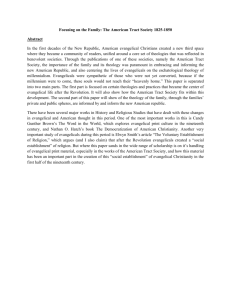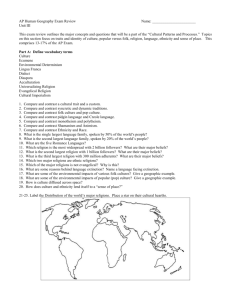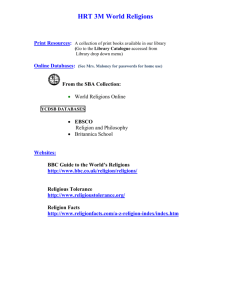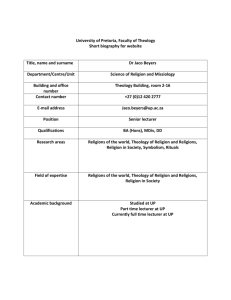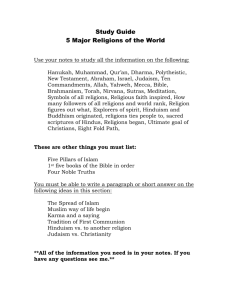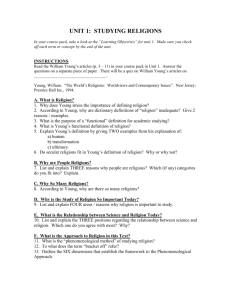Christian Mission Among Other Faiths
advertisement
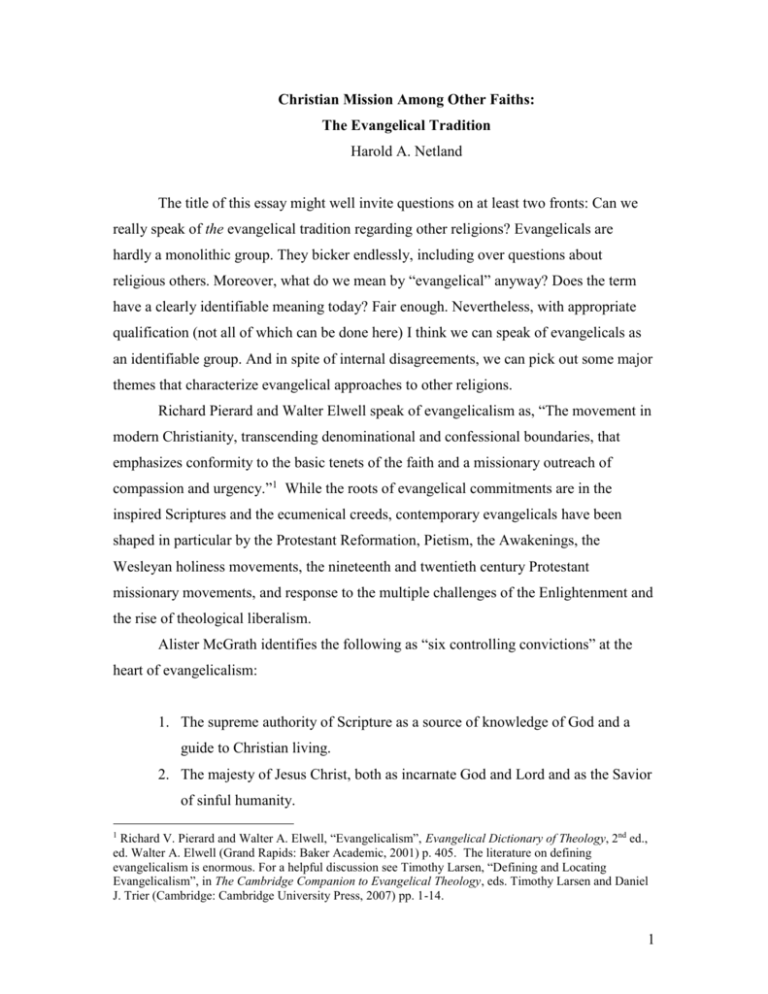
Christian Mission Among Other Faiths: The Evangelical Tradition Harold A. Netland The title of this essay might well invite questions on at least two fronts: Can we really speak of the evangelical tradition regarding other religions? Evangelicals are hardly a monolithic group. They bicker endlessly, including over questions about religious others. Moreover, what do we mean by “evangelical” anyway? Does the term have a clearly identifiable meaning today? Fair enough. Nevertheless, with appropriate qualification (not all of which can be done here) I think we can speak of evangelicals as an identifiable group. And in spite of internal disagreements, we can pick out some major themes that characterize evangelical approaches to other religions. Richard Pierard and Walter Elwell speak of evangelicalism as, “The movement in modern Christianity, transcending denominational and confessional boundaries, that emphasizes conformity to the basic tenets of the faith and a missionary outreach of compassion and urgency.”1 While the roots of evangelical commitments are in the inspired Scriptures and the ecumenical creeds, contemporary evangelicals have been shaped in particular by the Protestant Reformation, Pietism, the Awakenings, the Wesleyan holiness movements, the nineteenth and twentieth century Protestant missionary movements, and response to the multiple challenges of the Enlightenment and the rise of theological liberalism. Alister McGrath identifies the following as “six controlling convictions” at the heart of evangelicalism: 1. The supreme authority of Scripture as a source of knowledge of God and a guide to Christian living. 2. The majesty of Jesus Christ, both as incarnate God and Lord and as the Savior of sinful humanity. Richard V. Pierard and Walter A. Elwell, “Evangelicalism”, Evangelical Dictionary of Theology, 2nd ed., ed. Walter A. Elwell (Grand Rapids: Baker Academic, 2001) p. 405. The literature on defining evangelicalism is enormous. For a helpful discussion see Timothy Larsen, “Defining and Locating Evangelicalism”, in The Cambridge Companion to Evangelical Theology, eds. Timothy Larsen and Daniel J. Trier (Cambridge: Cambridge University Press, 2007) pp. 1-14. 1 1 3. The lordship of the Holy Spirit. 4. The need for personal conversion. 5. The priority of evangelism for both individual Christians and the church as a whole. 6. The importance of the Christian community for spiritual nourishment, fellowship and growth.2 On this understanding, a large portion of Christians today in Asia, Africa and Latin America can be considered evangelicals. It is true that contemporary evangelicalism has been closely associated with twentieth century North American Christianity. American evangelicalism emerged as an alternative to fundamentalism, but especially during the past thirty years it has become linked with socially and politically conservative agendas. Many non-Western evangelicals have become uncomfortable with the label because of its association with recent American socio-political agendas. It is nevertheless important to recognize that, when defined theologically, large numbers of Christians worldwide are evangelicals and thus that global evangelicalism cannot be limited by factors peculiar to recent North American Christianity. Two significant markers of international evangelical identity emerged in the twentieth century: the Lausanne Movement and the World Evangelical Alliance (WEA). The Lausanne Movement, guided by the Lausanne Committee for World Evangelization, convened the first and second International Congresses on World Evangelization at Lausanne (1974) and Manila (1989). The Lausanne Covenant, produced at Lausanne I (1974), has become a symbol of evangelical identity worldwide. According to its official website, the WEA is a network of churches in 128 nations representing more than 420 million evangelical Christians. 3 It is impossible in this brief essay to do justice to the variegated nature of global evangelicalism and the ways in which evangelicals approach religious others. I will highlight some dominant themes in evangelical thought and practice, focusing upon developments in the West and materials available in English. 2 Alister McGrath, Evangelicalism and the Future of Christianity (Downers Grove, IL: InterVarsity Press, 1995) pp. 55-56. 3 http://www.worldevangelicals.org/aboutwea. Accessed July 17, 2009. 2 Evangelicals and mission Evangelicals have a deep commitment to evangelism and mission, and thus it is not surprising that perspectives on other religions reflect this commitment. We might take John Stott, architect of the Lausanne Covenant, as representative of evangelical understandings of mission. In a seminal 1975 work, Christian Mission in the Modern World, Stott said that while mission does not refer to everything that God is doing in the world or that the church is to do, it does describe “everything the church is sent into the world to do. ‘Mission’ embraces the church’s double vocation of service to be ‘the salt of the earth’ and ‘the light of the world’.” Central to Christian mission is evangelism, sharing the gospel of Jesus Christ with others. “And the good news about Jesus that we announce is that he died for our sins and was raised from death, and that in consequence he reigns as Lord and Savior at God’s right hand, and has authority both to command repentance and faith, and to bestow forgiveness of sins and the gift of the Spirit on all those who repent, believe and are baptized”.4 Similarly, Christopher Wright defines Christian mission as “our committed participation as God’s people, at God’s invitation and command, in God’s own mission within the history of God’s world for the redemption of God’s creation.”5 Evangelicals have emphasized the imperative of the Great Commission of Mt. 28:18-20, to “make disciples” of all peoples. Roughly 80% of the world’s population profess some religious allegiance.6 Thus, in “making disciples of all peoples” we are to share the gospel with sincere adherents of other religious ways. Evangelism and the call to repent of one’s sin and by God’s grace, to embrace Jesus as Lord and Savior, with all that this entails, are central components of an evangelical approach to religious others. 4 John R.W. Stott, Christian Mission in the Modern World (Downers Grove, IL: InterVarsity Press, 1975) pp. 19, 30, 54-55. For a helpful overview of recent evangelical theology of mission see Charles Van Engen, “Forty Years of Evangelical Mission Theology”, in Mission on the Way: Issues in Mission Theology (Grand Rapids: Baker, 1996) pp. 127-44. 5 Christopher J. H. Wright, The Mission of God: Unlocking the Bible’s Grand Narrative (Downers Grove, IL: InterVarsity Press, 2006) p. 23. 6 Joanne O’Brien and Martin Palmer, The Atlas of Religion (Berkeley: University of California Press, 2007) p. 14. 3 The question of other religions Until quite recently, evangelical discussions of other religions were limited largely to concerns relating directly to evangelism. Evangelical statements from the Berlin Congress on Evangelism (1966), the Wheaton Congress on the Church’s Worldwide Mission (1966), the Frankfurt Declaration (1970), and even the Lausanne Covenant (1974) are unambiguous on Jesus Christ as the one Lord and Savior for all humankind and the rejection of soteriological universalism. But they have almost nothing to say about non-Christian religions themselves. The 1974 Lausanne Covenant, for example, has only two sentences mentioning non-Christian religions, and then only in the context of rejecting syncretism and the idea that Christ’s salvation might be available through other religions. Lausanne II in Manila (1989) produced the Manila Manifesto, a document which, echoing the Lausanne Covenant, states, “We affirm that other religions and ideologies are not alternative paths to God, and that human spirituality, if unredeemed by Christ, leads not to God but to judgment, for Christ is the only way.”7 But the Manifesto gives greater attention to the religiously pluralistic world in which we are to make disciples and it introduces a fresh theme– a call for humility in our witness among religious others. In the past we have sometimes been guilty of adopting towards adherents of other faiths attitudes of ignorance, arrogance, disrespect and even hostility. We repent of this. We nevertheless are determined to bear a positive and uncompromising witness to the uniqueness of our Lord, in his life, death and resurrection, in all aspects of our evangelistic work including inter-faith dialogue.8 Much had changed since Lausanne 1974, and evangelical leaders, especially in Asia, were insisting that theologians and missiologists give greater attention to issues posed by the renewed vitality of other religions. “The Manila Manifesto”, in New Directions in Mission and Evangelization 1: Basic Statements, 19741991, eds. James A. Scherer and Stephen B. Bevans (Maryknoll, NY: Orbis, 1992) p. 293. 8 Ibid., p. 297. 7 4 By the 1990s there was growing recognition that evangelicals need to think more carefully about the relation between the gospel and the religions. In 1992, 85 evangelical theologians from 28 countries came together in Manila under the auspices of the World Evangelical Fellowship (now World Evangelical Alliance) for a conference on “The Unique Christ in Our Pluralistic World”. The resulting WEF Manila Declaration combines a strong commitment to the authority of Scripture and to Jesus Christ as the one Lord and Savior for all peoples with a concern to take seriously the religious realities of our world. The Manila Declaration acknowledges that, “We evangelicals need a more adequate theology of religions”9. A year later, veteran evangelical missiologist Ralph Covell observed, [Evangelicals] are clear on the uniqueness of Christ and on God’s will to save all humanity, but they face the dilemma that most of the people of the world are comfortable in the religion in which they are born. Christ is the unique, but apparently not the universal, savior. When crucial target dates appear -- 1900 and 2000, for example -- they mount new crusades to spread Christ’s message universally, but without giving any new, creative thought to the relationship of these efforts to the nagging questions posed by world religions. For the most part, evangelical scholars from the time of the Wheaton Congress on Evangelism (1966) to the Lausanne II International Congress on World Evangelization (Manila 1989) have been satisfied with predictably repeating their basic proof texts on the finality of Christ. Disturbing biblical texts which might nuance their attitudes to other religious expressions are glossed over, put in footnotes, subsumed under traditional views, or placed in the last paragraph of an article.10 More recently, evangelical theologians and missiologists have been developing evangelical perspectives on a range of issues relating to other religions. We will highlight briefly three subjects receiving significant attention. “The WEF Manila Declaration”, in The Unique Christ in Our Pluralist World, ed. Bruce J. Nicholls (Grand Rapids: Baker, 1994) p. 15, 10 Ralph Covell, “Jesus Christ and World Religions: Current Evangelical Viewpoints”, in The Good News of the Kingdom: Mission Theology for the Third Millennium, eds. Charles Van Engen, Dean S. Gilliland and Paul Pierson (Maryknoll, NY: Orbis, 1993) pp. 162-63. 9 5 Salvation Evangelicals insist that Jesus Christ is the only Savior for all of humankind; reconciliation with God comes only through the person and work of Jesus Christ. But this naturally raises questions about the scope of salvation and how such a particularist emphasis relates to God’s universal salvific will. For evangelicals, this tension has been framed in terms of the destiny of those who do not hear the gospel. There has long been some disagreement among evangelicals on the issue, but the question became especially contentious for North American evangelicals during the 1990s. Evangelicals generally agree that the Biblical witness is clear on the following points: (1) All people are sinners and face God's just condemnation for sin. (2) Salvation -- that is, forgiveness of sin, justification and reconciliation with God, and all that this implies -- is available only on the basis of the sinless person and atoning work of Jesus Christ. (3) No one is saved merely by doing good works or being religiously devout. (4) Salvation is always only by God's grace and must be personally accepted through faith. (5) Ultimately, not everyone will be saved. (6) God is entirely righteous, just, and fair in his dealings with humankind. (7) Both out of a sense of obedience to her Lord and compassion for the lost, the church is to be actively engaged in making disciples of all peoples. But is it nevertheless possible for those who have never heard the gospel to be saved? Contemporary evangelical responses fall into three broad categories. First, many evangelicals hold that only those who hear the gospel and explicitly respond in faith to the name of Jesus in this life can be saved. Explicit knowledge of the gospel of Jesus Christ is thus necessary for salvation.11 Many evangelicals regard this as the traditional evangelical position and it has been prominent in conservative evangelical theologies of mission. A rather different perspective is that of the “wider hope”, which maintains that on the basis of Scripture we can expect that large numbers of those who never hear the 11 See John Piper, Let the Nations Be Glad! (Grand Rapids: Baker, 1993); Ronald Nash, Is Jesus the Only Savior? (Grand Rapids: Zondervan, 1994); Carl F. H. Henry, God, Revelation, and Authority, vol. 6 (Waco, Texas: Word, 1983) pp. 367-69; and Faith Comes By Hearing: A Response to Inclusivism, eds. Christopher W. Morgan and Robert A. Peterson (Downers Grove: InterVarsity Press, 2008). 6 gospel nevertheless will be saved. 1992 saw the publication of Clark Pinnock’s A Wideness in God's Mercy and John Sanders’ No Other Name: An Investigation into the Destiny of the Unevangelized.12 Pinnock and Sanders argue that although Jesus Christ is the one Savior for all people and salvation is possible only because of Christ’s atoning work on the cross, one need not know explicitly about Jesus Christ and the cross to be saved. They claim that we can thus be optimistic about the salvation of the unevangelized. The writings of Pinnock and Sanders provoked a vigorous – and sometimes acrimonious – debate among North American evangelicals.13 Many evangelicals, however, find themselves somewhere between the so-called traditional and “wider hope” positions, convinced that each goes beyond what the Biblical data affirm. Those in this group are willing to admit in principle that God might save those who have never explicitly heard the gospel, but they add that we simply do not know whether this occurs or, if so, how many might be saved in this manner.14 The clear pattern in the New Testament is that people first hear the gospel and then, through the work of the Holy Spirit, respond in faith to the proclamation of the Word and are saved. The 1992 Manila Declaration takes up the issue and begins by affirming that, “All salvation in the biblical sense of eternal life, life in the kingdom, reconciliation with God Clark Pinnock, A Wideness in God’s Mercy: The Finality of Jesus Christ in a World of Religions (Grand Rapids: Zondervan, 1992); John Sanders, No Other Name: An Investigation into the Destiny of the Unevangelized (Grand Rapids: Eerdmans, 1992). A similar view, from a Reformed perspective, is found in Terrance L. Tiessen, Who Can Be Saved? Reassessing Salvation in Christ and World Religions (Downers Grove: InterVarsity Press, 2004) 13 Interestingly, in 1970 J.N.D. Anderson, a highly respected British evangelical, published essentially the same view as Pinnock and Sanders, but his writings were not particularly controversial. See J. N. D. Anderson, Christianity and Comparative Religion (Downers Grove, IL: InterVarsity Press, 1970); and Sir Norman Anderson, Christianity and World Religions: The Challenge of Pluralism (Downers Grove, IL: InterVarsity Press, 1984). For two decades these were the major evangelical treatment of the relation between Christian faith and other religions. Anderson was regularly invited by evangelicals to speak and write on the subject, expressing a kind of unofficial evangelical perspective on other religions. See Sir Norman Anderson, “The Gospel: A Story to Tell to the Nations”, in Evangelical Roots, ed. Kenneth Kantzer (Nashville, TN: Thomas Nelson, 1978) pp. 173-83; idem, “Christianity and the World’s Religions” in The Expositor's Bible Commentary, vol. 1, ed. Frank Gabelein. (Grand Rapids: Zondervan, 1979) pp. 143-57; and idem, “A Christian Approach to Comparative Religion”, in The World’s Religions, ed. Sir Norman Anderson (Leicester, England: InterVarsity Press, 1975) pp. 228-37. 14 See, for example, John Stott, The Authentic Jesus (London: Marshall Morgan and Scott, 1985) p. 83; J. I. Packer, “Evangelicals and the Way of Salvation”, in Evangelical Affirmations, ed. Kenneth S. Kantzer and Carl F. H. Henry (Grand Rapids: Zondervan, 1990) pp. 121-123; Millard Erickson, “Hope for Those Who Haven’t Heard? Yes, but…” Evangelical Missions Quarterly 11 (April 1975) pp. 122-26; David Clark, “Is Special Revelation Necessary for Salvation?” in Through No Fault of Their Own? William V. Crockett and James Sigountos, eds. (Grand Rapids: Baker, 1991) pp. 40-41; Christopher J. H. Wright, What’s So Unique About Jesus? (Eastburne, England: Monarch, 1990) pp. 36-39. 12 7 and forgiveness of sins comes solely from the person and work of Jesus Christ." But it leaves unresolved the question of the unevangelized: In our modern pluralistic world, many Christians ask: ‘is it not possible that there might be salvation in other religions?’ The question is misleading because it implies that religions have the power to save us. This is not true. Only God saves. All people have sinned, all people deserve condemnation, all salvation stems solely from the person and atoning work of Jesus Christ, and this salvation can be appropriated solely through trust in God’s mercy. The question, therefore, should be rephrased as: ‘Can those who have never heard of Jesus Christ be saved?’ Old Testament saints, who did not know the name of Jesus, nevertheless found salvation. Is it possible that others also might find salvation through the blood of Jesus Christ although they do not consciously know the name of Jesus? We did not achieve a consensus on how to answer this question. More study is needed. We did agree that salvation is to be found nowhere else than in Jesus Christ. The truth to be found in other religious teachings is not sufficient, in and of itself, to provide salvation. We further agreed that universalism (that all people without exception will be saved) is not biblical. Lastly, we agreed that our discussion of this issue must not in any way undercut the passion to proclaim, without wavering, faltering or tiring, the good news of salvation through trust in Jesus Christ.15 Advocates of all three positions outlined above have been strong supporters of Christian mission and the need for sensitive and appropriate evangelism among followers of other religious ways. Interreligious dialogue Many evangelicals have been suspicious of the term “interreligious dialogue” because of the perception that much of the dialogue associated with the World Council of 15 “The Manila Declaration”, p. 15. 8 Churches undermines evangelical theological commitments and evangelism. The 1974 Lausanne Covenant, for example, states, “We also reject as derogatory to Christ and the gospel every kind of syncretism and dialogue which implies that Christ speaks equally through all religions and ideologies.”16 There is no suggestion in the Covenant that there might be appropriate forms of dialogue. Forms of interreligious dialogue that entail that God’s revelation in the Incarnation and the written Scriptures are not definitive, or that Jesus Christ in principle is not superior to other religious leaders, or that followers of other religions do not need to be reconciled to God through Christ will be rejected by evangelicals. But there is no reason to hold that such problematic assumptions are essential to interreligious dialogue. Evangelicals are increasingly acknowledging that appropriate forms of interreligious dialogue are an important component of Christian mission today.17 Interreligious dialogue can serve many positive purposes, including deepening understanding of other religions, enhancing mutual respect, reducing tensions, and fostering ways of cooperating in appropriate ways for the common good. A particularly significant example of evangelical involvement in interreligious dialogue is provided by the faculty of Fuller Theological Seminary, in Pasadena, California. Doug McConnell, Dean of the School of Intercultural Studies at Fuller states, “Currently the seminary community has formally engaged in dialogues that focus on the Abrahamic faiths – Judaism and Islam – and on groups from which we as evangelicals have either come out of – Catholics – or those who have come from us – Mormons.”18 As part of these efforts, in 2005 Fuller Theological Seminary joined with the Salam Institute of Peace and Justice and the Islamic Society of North America in participating in the Conflict Transformation Program of Dialogue with Muslims and Evangelical Christians, a three year project sponsored by the U.S. Department of Justice. The purpose of the project was “to seek common practices, patterns, and pathways for conflict reduction, resolution, and transformation between faiths as well as to learn how to better resolve “Lausanne Covenant”, p. 254. The Manila Manifesto links interreligious dialogue with evangelism as part of our witness. See “Manila Manifesto”, p. 297. 18 Doug McConnell, “Mutual Understanding: An Evangelical Case Study”, unpublished paper, p. 4. Cited with permission of the author. 16 17 9 differences within our individual faiths.”19 To be sure, not all evangelicals are comfortable with the proactive stance of Fuller Seminary on interreligious dialogue. But increasingly evangelicals, both on nonformal and formal or institutional levels, are building bridges to other faith communities in an effort to defuse religious tensions and establish mutual understanding and respect. Theology of religions There are encouraging signs that evangelicals are taking the issues posed by the religious realities of our world seriously and are beginning to develop the contours of an evangelical theology of religions. Veli-Matti Kärkkäinen defines theology of religions as "that discipline of theological studies which attempts to account theologically for the meaning and value of other religions. Christian theology of religions attempts to think theologically about what it means for Christians to live with people of other faiths and about the relationship of Christianity to other religions"20 The past four decades have seen an enormous amount of literature on theology of religions, most written by Roman Catholics and mainline Protestants. But since about 1990 evangelicals too have joined the discussion. Gerald R. McDermott has written several books, exploring the doctrine of revelation in relation to other religions as well as suggesting a theological framework for understanding the religions.21 In addition to An Introduction to the Theology of Religions, Kärkkäinen has written a work in which he explores the implications of the doctrine of the Trinity for an evangelical understanding of other religions.22 Although his proposal is controversial, Amos Yong has developed a creative pneumatological approach to the theology of 19 Peace-Building By, Betweeen, and Beyond Muslims and Evangelical Christians, eds. Mohammed AbuNimer and David Augsberger, (Lanham, MD: Lexington Books, 2009) p. xii. As cited in McConnell, “Mutual Understanding”, p. 5. 20 Veli-Matti Kärkkäinen, An Introduction to the Theology of Religions (Downers Grove, IL: InterVarsity Press, 2003) p. 20. 21 Gerald R. McDermott, Can Evangelicals Learn from World Religions? Jesus, Revelation and Religious Traditions (Downers Grove, IL: InterVarsity Press, 2000); and idem, God’s Rivals: Why has God Allowed Different Religions? (Doeners Grove, IL: Intervarsity Press, 2007). 22 Veli-Matti Kärkkäinen, Trinity and Religious Pluralism: The Doctrine of the Trinity in Christian Theology of Religions (Burlington, VT: Ashgate, 2004). 10 religions.23 Timothy Tennent, Winfried Corduan, Chris Wright, Stanley Grenz, D. A. Carson, Ida Glaser, Vinoth Ramachandra, Ajith Fernando, Harold Netland, Charles Van Engen, Ken Gnanakan and Kang San Tan, among others, have all made important contributions to an evangelical theology of religions.24 The 2002 Annual Meeting of the Evangelical Theological Society was devoted to the subject “Evangelical Christianity and Other Religions”.25 Terry Muck and Frances Adeney have produced a groundbreaking work, Christianity Encountering World Religions, which combines history with theology and missiology in a creative approach – that of “giftive mission” -- to understanding and responding to religious others in the twenty-first century.26 In the days ahead evangelicals need to give careful and creative thought to developing a comprehensive theology of religions that is both faithful to Scripture and 23 Amos Yong, Beyond the Impasse: Toward a Pneumatological Theology of Religions (Grand Rapids: Baker, 2003). 24 See Timothy Tennent, Christianity at the Religious Roundtable: Evangelicalism in Conversation with Hinduism, Buddhism, and Islam (Grand Rapids: Baker Academic, 2002), and idem, Theology in the Context of World Christianity (Grand Rapids: Zondervan, 2007); Winfried Corduan, A Tapestry of Faiths: The Common Threads Between Christianity and World Religions (Downers Grove, IL: InterVarsity Press, 2002); Christopher J. H. Wright, “The Christian and Other Religions: The Biblical Evidence”, Themelios 9:2 (1984) pp. 4-15; idem, Thinking Clearly About the Uniqueness of Jesus (Crowborough, England: Monarch, 1997); S. J. Grenz, “Toward an Evangelical Theology of Religions”, Journal of Ecumenical Studies 31 (1994) pp. 49-65; D. A. Carson, The Gagging of God: Christianity Confronts Pluralism (Grand Rapids: Zondervan, 1996); Ida Glaser, The Bible and Other Faiths: Christian Responsibility in a World of Religions (Downers Grove, IL: InterVarsity Press, 2005); Vinoth Ramachandra, The Recovery of Mission: Beyond the Pluralist Paradigm (Grand Rapids: Eerdmans, 1996); Ajith Fernando, Sharing the Truth in Love: How to Relate to People of Other Faiths (Grand Rapids: Discovery House Publishers, 2001); Harold Netland, Encountering Religious Pluralism: The Challenge to Christian Faith and Mission (Downers Grove, IL: InterVarsity Press, 2001); idem, “Theology of Religions, Missiology, and Evangelicals”, Missiology: An International Review 33:2 (April 2005) 142-58; Charles Van Engen, “The Uniqueness of Christ in Mission Theology”, in Landmark Essays in Mission and World Christianity, eds. Robert L. Gallagher and Paul Hertig, (Maryknoll, NY: Orbis, 2009) pp. 160-75; Ken Gnanakan, The Pluralist Predicament (Bangalore: Theological Book Trust, 1992); Kang San Tan, “Evangelical Missiology From an East Asian Perspective: A Study on Christian Encounter With People of Other Faiths”, in Global Missiology for the 21st Century: The Iguassu Dialogue, ed. William D. Taylor (Grand Rapids: WEF / Baker, 2000) pp. 295-306. Other significant evangelical works include One God, One Lord: Christianity in a World of Religious Pluralism, 2nd ed., ed. Andrew D. Clarke and Bruce W. Winter (Grand Rapids: Baker, 1992); No Other Gods Before Me? Evangelicals and the Challenge of World Religions, ed. John G. Stackhouse, Jr. (Grand Rapids: Baker, 2001); The Trinity in a Pluralistic Age: Theological Essays on Culture and Religion, ed. Kevin J. Vanhoozer (Grand Rapids: Eerdmans, 1997); and Christianity and the Religions: A Biblical Theology of World Religions, eds. Edward Rommen and Harold Netland, Evangelical Missiological Society Series Number 2 (Pasadena, CA: William Carey Library, 1995). 25 See Biblical Faith and Other Religions: An Evangelical Assessment, ed. David W. Baker (Grand Rapids: Kregel Publications, 2004). 26 Terry Muck and Frances S. Adeney, Christianity Encountering World Religions: The Practice of Mission in the Twenty-First Century (Grand Rapids: Baker Academic, 2009). 11 reflects accurately the religious realities of our world. Such a framework should explore the implications of Trinitarian theology for our understanding of other religions. In what ways and to what extent are the Father, Son and Holy Spirit present and active throughout creation and human affairs? Here we must navigate carefully the tension between universality and particularity. God’s presence and activity are certainly not limited to the church, but neither should we think of the operations of the eternal Logos or Holy Spirit entirely apart from the ministry of the incarnate Son. The dynamic tension between the universality of the triune God and the particularity of the incarnate Word cannot be eliminated. A comprehensive theology of religions should also develop a more nuanced understanding of “religion”. To be sure, Biblical and theological resources are critical for such understanding. But so also are the social sciences – history, anthropology, sociology, and the phenomenology of religions. What is needed are understandings that reflect accurately not only the Biblical witness but also the lived realities of those we refer to as Hindus or Muslims or folk animists. Moreover, religion has much in common with culture, although neither concept can be simply reduced to the other. Evangelical missiology needs to develop the kind of nuanced theological understanding of religion that it has adopted with respect to culture. Evangelical approaches to religious others will continue to be shaped by the Biblical witness to Jesus Christ as the only Lord and Savior for all humankind, including devout adherents of other religions. Although Christian mission is certainly broader than merely evangelism and the call to repentance, it must include evangelism as a central element. But the world in which we are to make disciples of Jesus Christ is one marked by the resurgence of traditional religions as well as a bewildering array of new religious movements and spiritualities. It is a post-colonialist world that is acutely aware of the injustices of four centuries of Western imperialism and that believes – rightly or wrongly – that Christianity shares the blame for such injustice. Deeply rooted ethnic, nationalistic and religious tensions erupt in violence, causing many to wonder whether religiously diverse communities can indeed live together peacefully. Religious conversion is increasingly seen as an obstacle to peaceful coexistence. The issues here are complex and require of the Christian proper navigation of two sets of obligations – our responsibilities 12 as disciples of Jesus Christ and as good citizens, both locally and globally. We need to be guided by both the Great Commission (Mt. 28:18-20) and the Great Commandment (Mt 22:35-40). In obedience to our Lord, we are to “make disciples” of all people. As Christ’s disciples, we are to love God with our entire being and to love our neighbor – including religious others – as we love ourselves. Evangelicals must approach Christian mission in today’s world with an attitude of humility and repentance for the ways in which Christians have sometimes treated religious others in the past. New models of evangelism and disciple-making that are appropriate for a world full of religious tension and increasingly hostile to evangelism must be developed. The church must show a skeptical world that Christians can be strongly committed to Jesus Christ as the one Lord and Savior for all peoples while also working to promote peaceful relations among religious traditions. Evangelicals must demonstrate through concrete actions that we do accept in appropriate ways the ethnic, cultural and religious diversity in our world. But at the same time, we cannot abandon our commitment to Jesus Christ. So even as we embrace Buddhists and Muslims as fellow human beings created in God's image we must also urge them to be reconciled to God by acknowledging Jesus Christ as their Lord and Savior.27 27 I am grateful to Vinoth Ramachandra, Craig Ott, How Chuang Chua and Doug McConnell for insights that have strengthened this essay. They are not, of course, responsible for any remaining deficiencies. 13

